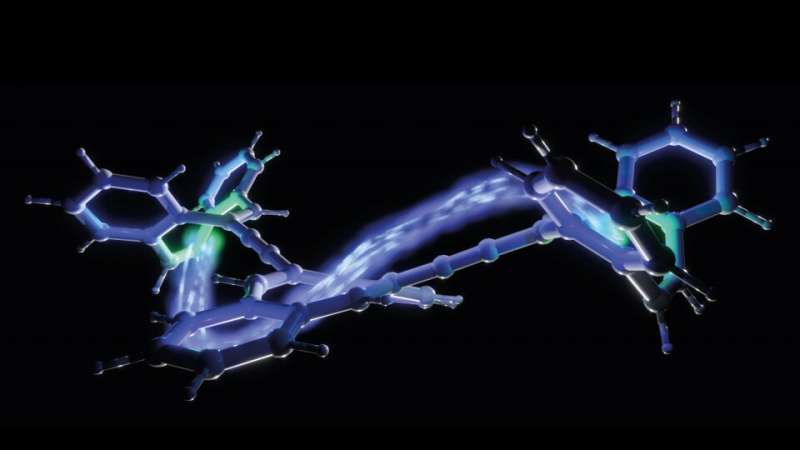Researchers create molecule that can pave way for mini-transistors

Researchers at Lund University in Sweden have succeeded in developing a simple hydrocarbon molecule with a logic gate function, similar to that in transistors, in a single molecule. The discovery could make electric components on a molecular scale possible in the future. The results are published in Nature Communications.
Manufacturing very small components is an important challenge in both research and development. One example is transistors—the smaller they are, the faster and more energy efficient our computers become. But is there a limit to how small logic gates can become? And is it possible to create electric machines on a molecular scale? Yes, perhaps, is the answer from a chemistry research team at Lund University.
"We have developed a simple hydrocarbon molecule that changes its form, and at the same time goes from insulating to conductive, when exposed to electric potential. The successful formula was to design a so-called anti-aromatic ring in a molecule so that it becomes more robust and can both receive and relay electrons," says Daniel Strand, chemistry researcher at Lund University.
Many organic molecules consist of aromatic benzene rings, ie flat rings made up of six carbon atoms. A simple example is graphene. However, such molecules do not change properties or shape if subjected to electric potential. Therefore, the research group chose to look at hydrocarbons made up of rings with eight carbon atoms. These are anti-aromatic and bent into a tub-shape. If two electrons are injected into such a molecule, it flattens and goes from insulating to conducting—a function similar to that of a transistor switching from 0 to 1.
"A unique aspect of the molecules is that they are so simple. They only consist only of carbon and hydrogen atoms which makes them easier to produce synthetically," says Daniel Strand.
The discovery means researchers can now think about how to develop both electrical switches and new mechanical systems at the single-molecule level using anti-aromatic hydrocarbons.
"Molecules that change form in response to electric potential lead to exciting possibilities. One can imagine energy-efficient computer architectures and in the future perhaps electric machines on a molecular scale," concludes Daniel Strand.
More information: Magdalena Tasić et al, Electro-mechanically switchable hydrocarbons based on [8]annulenes, Nature Communications (2022). DOI: 10.1038/s41467-022-28384-8
Journal information: Nature Communications
Provided by Lund University





















